Dog Shampoos
If you have decided to bathe your dog at home rather than go to a professional groomer, you have some big decisions to make. There are nearly as many brands of dog shampoo as there are of human shampoo, and choosing the wrong one can cause your dog to be itchy, oily, or may even cause his fur to fall out!
How often should I bathe my dog?
Bathing too frequently can cause your dog’s skin to become dried out, but bathing too infrequently can affect the quality of the dog’s coat. Anything that affects the dog’s skin and coat needs to be considered when choosing a shampoo. The dog’s age, health, and skin condition are important, as are the environment and climate where the dog lives.
Obviously, the biggest factor in determining how often to bathe your dog is how often he gets dirty. If he likes to chase skunks or roll in dead things, you will likely be bathing him more often than if he spends most of his life curled up on your couch. Another important consideration is the color of your dog’s coat. White dogs generally look dirty sooner than dark dogs, and are often bathed more frequently as a result. Fleas and dandruff present special problems which must be addressed.
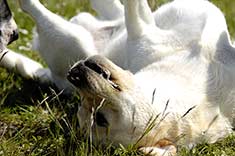
The best guide to how often your dog should be bathed is experience. Try washing the dog every two weeks with a good quality shampoo. If the dog’s skin seems to get too dry, cut back to once a month. If he gets too dirty between shampoos, try bathing him every 7 – 10 days. One trick you might use to cut back on the number of baths you are giving is to brush your dog frequently. Brushing will remove not only loose fur, but also much of the dirt and other contaminants you would normally remove by bathing.
Shampoo techniques
Before you give your dog a bath, be sure to brush him thoroughly. This will not only remove tangles before the coat gets wet, it will also distribute oils from the skin throughout the fur to make it less likely that the shampoo will be too drying.
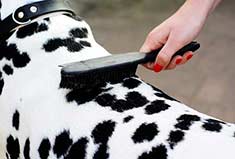
Wet your dog thoroughly before you begin applying shampoo. Dog shampoos are relatively low sudsing as compared to human shampoos so extra water will help you in distributing the shampoo.
Use only a small amount of shampoo so it is easier to rinse out and to prevent dryness. Rinse your dog several times to prevent leftover soap from irritating his skin.
Dry your dog’s ears thoroughly after bathing to prevent yeast infections. This is particularly important for dogs with pendulous ears like those in the hound group.
If you have to bathe your dog often, consider using a conditioner or leave-in treatment to prevent dryness.
If your dog is smelly, but his skin is overly dry, try sprinkling the dog with baking soda and rubbing it in with your hands before brushing. This can help to clean away smells while keeping the dog’s skin moist.
Can I use my own shampoo on my dog?
Using human shampoos on a dog is definitely not recommended. Human shampoos contain sulfates designed to remove oil, which causes dry skin and itchiness. When your dog begins to scratch himself, he can break the skin which can lead to hot spots and skin infections.
In addition, if you have applied a topical flea and tick medication such as Advantage or Frontline, the medication is distributed in your dog’s sebaceous (oil) glands. Using a human shampoo removes the oils, carrying the medication with them.
What should I look for when comparing ingredients in different dog shampoos?
Dogs have the highest skin pH level of any mammal. Their shampoos should be specially formulated with a lower pH than most human shampoos.
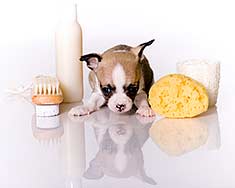
Fatty acids are important to the dog’s skin and coat health, as is Vitamin E. Vitamins such as biotin and vitamin B-5 can help thicken and texturize your dog’s coat.
Extras such as scents, deodorants, and additives can irritate your dog’s skin and should be avoided. Look for natural ingredients that are hypoallergenic to reduce the chances of creating a worse situation for your dog when he is clean than when he was dirty! Popular natural ingredients in dog shampoos include aloe vera, citrus extracts, and eucalyptus extracts.
There is some controversy as to the benefit of tea tree oil, which is often added to dog shampoos. Although it is a natural ingredient, it is a rather abrasive additive that strips oil from the dog’s coat and could be toxic to the dog if not thoroughly rinsed.
Medicated dog shampoos
Benzoyl peroxide may be important if your dog has an existing skin disease. Seborrhea, some types of dermatitis, and demodectic (follicular) mange all respond well to benzoyl peroxide. Shampoos with benzoyl peroxide are used to flush out the dog’s hair follicles to prevent bacterial infections from starting or spreading.
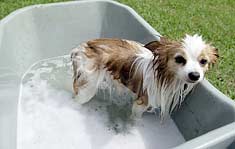
This ingredient is anti-bacterial and is capable of removing grease and oil from the skin. As you might imagine, this product dries out the dog’s skin and should never be used more than once a week. However, isolated hot spots or places of infection can be treated daily.
The benzoyl peroxide in dog shampoos is slightly different from that used in human acne medication. Do not use your teenager’s Stridex on your dog, as it will likely cause redness and pain for the animal.
Hydrocortisone may be used in some dog shampoos to relieve itching, whether the source of the itching is fleas, insect bites, allergies, or just general irritation. Hydrocortisone works by reducing inflammation, which is what causes localized itching. Some hydrocortisone shampoos include aloe vera to provide further soothing of the skin.
The main benefit to using shampoos that relieve itching is that the dog will not lick and scratch as much. When a dog scratches, he further damages his skin and causes the inflammatory response to increase. By relieving the itch, you are giving your dog’s skin a chance to heal more quickly.
Hydrocortisone is a steroid and should never be allowed to get inside your dog’s mouth. Care should be taken to keep all shampoos out of your dog’s mouth, eyes, and nose, often by avoiding bathing the dog’s head entirely. Hydrocortisone shampoos should not be used to bathe your dog every week, but only when needed. Regular shampoos should be used when your dog is dirty, but if your vet prescribes hydrocortisone to relieve itching, you should use it only until the dog’s skin condition clears up and special treatment is no longer needed.
Flea and tick shampoos may be needed when your dog spends a great deal of time outdoors, particularly in warm weather, or if your dog has been exposed to another animal who passed on his infestation. A pesticide known as pyrethrin is added to shampoo to kill fleas and ticks. Again, this chemical can harm your dog if it gets in his eyes and mouth, so take care when shampooing around the head. Carefully follow the label directions to make sure you are not applying too much of the toxic chemicals to your dog. Rinse well to prevent your dog from licking off any of the pesticide after his bath.
How much money should I spend on dog shampoo?
You can buy a cheap shampoo, but you will likely regret it. Your dog’s skin will itch, causing him to scratch. This can lead to excessive shedding, and can be expensive in the long run if your dog’s skin becomes infected or if he develops hot spots as a result of your trying to save a few bucks.
Keep in mind that a bottle of shampoo, particularly if purchased in bulk, will last several months. Your actual daily cost is quite low if you look at it this way, even if you buy a top-of-the-line product.
You want to find a product that is tearless, rinses well, is easy to use, and leaves your dog with a shiny coat. You might want to buy small bottles of several different products and try them out before committing to a gallon jug.
The Doctors Foster and Smith Web site drsfostersmith.com has a great review of different types of dog shampoo which can help you select the one that is best for your dog.
Doggies Den: Latest Articles
 Homemade Thanksgiving Treats for Your Dog
Homemade Thanksgiving Treats for Your Dog
NUTRITION We all want to include our dogs in our holiday celebrations, but hopefully, you're aware that sharing table scraps with your dog isn't always the best idea.
 Keeping Your Dog Safe during the Summer Months
Keeping Your Dog Safe during the Summer Months
HEALTH Summer is coming on fast, so it’s time to plan how you will keep your dog safe and healthy through the lazy, carefree, warm days.
 Vaccination Time Again-Keeping Your Puppy Healthy
Vaccination Time Again-Keeping Your Puppy Healthy
DOG HEALTH So you have your new puppy picked out. There are quite a few shots, treatments and examinations that will keep the newest member of your family healthy.
 Canine Thanksgiving Feast
Canine Thanksgiving Feast
NUTRITION With the wide variety of food at Thanksgiving dinner, chances are you'll want to give your dog something special, too. If you're contemplating what to feed your dog for the holiday, here is a guide to a great Canine Thanksgiving Feast.
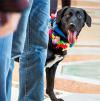 Dog Walking Tips Every Owner Should Know
Dog Walking Tips Every Owner Should Know
DOG FUN Walking your dog is not only crucial to keeping him healthy and happy, it strengthens the bond between your canine friend and his caregiver. There are a lot of obstacles out there. Don’t forget these simple tips to keep your walk fun and safe in the outside world.
 The Benefits of Physiotherapy for your Dog
The Benefits of Physiotherapy for your Dog
HEALTH The same techniques that physiotherapists use to treat a variety of injuries and conditions in humans have been adapted to suit animals with great success. Family pets, show dogs, and working dogs can all benefit greatly from physiotherapy. Dogs whose activities involve a lot of agility are especially susceptible to the types of problems that physiotherapy can address.
 The Decision- Adding a Dog to Your Family
The Decision- Adding a Dog to Your Family
FIRST TIME OWNERSBringing a dog into your family is a decision where many people don’t realize it’s magnitude until after they have the dog. There are a number of things that you need to research before you decide to purchase a dog, and it starts right in your own home.
 Bringing Your Dog Into Your New Baby's Life
Bringing Your Dog Into Your New Baby's Life
HEALTH Many believe that a dog and a new baby cannot happily coexist, so therefore the dog has to go. This is not necessarily the case.  A new baby does not mean you have to abandon your dog.

Doggies Den:
Most Popular Articles

Dog Pregnancy Symptoms
HEALTHIf you suspect your dog might be pregnant, check out part one in this series on pregnant dogs, where we cover pregnant dog symptoms.
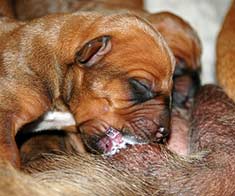
Dog Birth
HEALTHIn the third article of our dog pregnancy series, we look at the wonderful, but messy, process of bringing newborn puppies into the world.
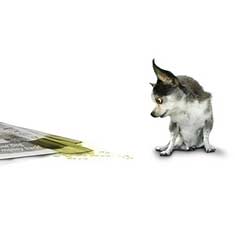
Indoor Dog Potties
DOG PRODUCTSIt's been a long day at work. You were so busy, you didn't even take time to eat a sandwich, let alone run home to let your dog out. You're on your way home, knowing the poor dog is crossing his or her legs by now, when your car breaks down, delaying you even further. Can't somebody make this easier?
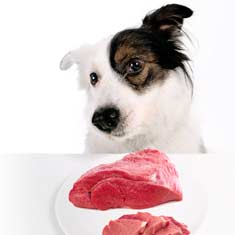
Your Dog’s Digestive System
PHYSIOLOGYEver wonder why your dog eats so fast? Or why he eats gross things? Or why he gets sick to his stomach? Or why his waste stinks so bad? Some of these things are normal, some are not.

Canine Respiratory System
BREATHINGThe basic function of your dog's respiratory system is to bring oxygen in to and remove carbon dioxide from the body. Knowing the symptoms of respiratory diseases can help you help your stay healthy.
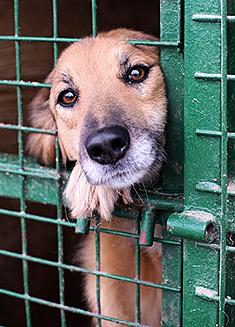
Shelter Dog Adoption Tips for Success
ADOPTION Are you intimidated by the prospect of "rescuing" a dog from a shelter? One reason that you may be wary of adopting a dog from a shelter is not knowing how to choose. Adopting a dog from a shelter can be a rewarding process, if you're prepared to do a reasonable amount of research.
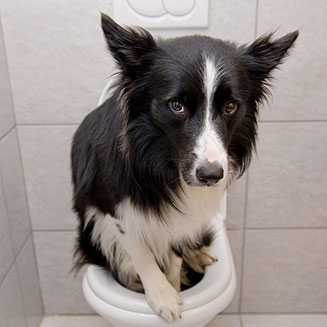
Canine Urinary Tract Infections
SYMPTOMS AND TREATMENTDoes your dog seem to be having trouble relieving his or her bladder? Learn how to recognize the signs of urinary tract infections and how to treat them before they spread.
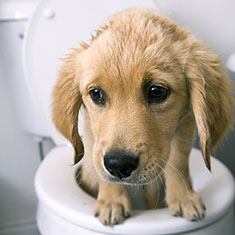
What to do for Dog Diarrhea
SYMPTOMS AND REMEDIESIf you have dogs in your house for any length of time, you have likely experienced at least one bout of dog diarrhea. Beyond the pain in the tuckus involved in cleaning up the mess, you should know what causes diarrhea, and when it's important to see the vet.

What to do for a Dog Bite
DOG BEHAVIOR Getting bitten by a dog can be scary, and you may be tempted to run around in circles for a while, trying to figure out what to do. Here's our guide to help you manage the situation.
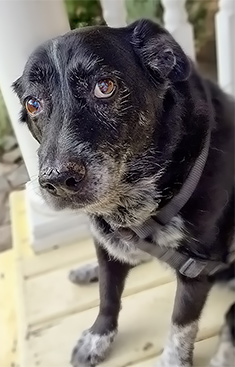
Top Ten Tips for Living with a Senior Dog
DOG HEALTH Bringing home a new puppy is so exciting, but it doesn’t take all that long for your exuberant puppy to grow into a senior dog who may have special needs. Here are the doggies.com top ten tips for taking care of your companion who has been with you through so much.
